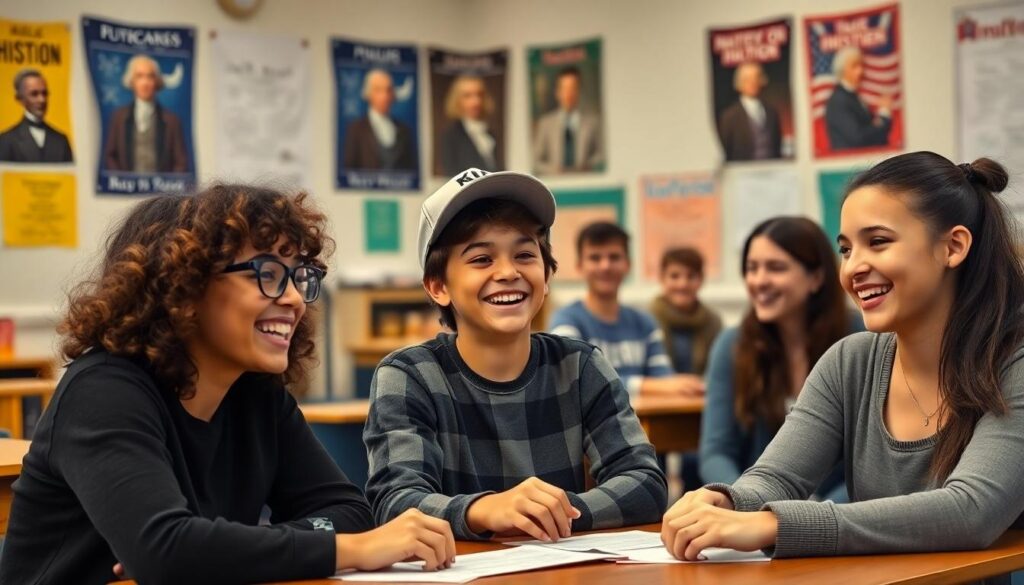Ready for a historical laugh? We’ve rounded up the best APUSH puns that’ll make your American history studies way more entertaining. These clever wordplays combine important historical events, figures, and concepts from AP U.S. History with hilarious twists that’ll help you remember key information while cracking a smile.
10 Revolutionary APUSH Puns That Will Make History
- Why did the Articles of Confederation need therapy? Because they had commitment issues! Just like those first governing documents, we sometimes struggle to give proper authority to our relationships.
- What did Thomas Jefferson say to John Adams at their high school reunion? “I’m still writing you off in my Declaration of Independence!” Their famous rivalry continued even through their correspondence in later years.
- How does Alexander Hamilton pay for his coffee? With Hamil-TONS of cash! His face on the $10 bill ensures his financial legacy lives on even though his tragic duel with Aaron Burr.
- What’s Andrew Jackson’s favorite card game? TRAIL of TEARS! Unfortunately, his Indian Removal policies created one of the most devastating forced relocations in American history.
- Why couldn’t the colonists play poker on the Mayflower? Because William Bradford was standing on the deck! The Plymouth Colony governor certainly kept strict order among the early settlers.
- What did Abraham Lincoln say after a long night? “Four score and seven YAWNS ago!” His eloquent speeches often required tremendous preparation and stamina.
- How did the colonists communicate during the Boston Tea Party? They used T-Mobile! Their message to Britain about taxation without representation couldn’t have been clearer.
- What’s James K. Polk’s favorite question? “Do you want to see my Manifest Destiny?” His territorial ambitions expanded America all the way to the Pacific Ocean.
- Why did Franklin Roosevelt bring a ladder to Congress? To help with his New Deal! His ambitious programs aimed to lift America out of the Great Depression.
- What did Woodrow Wilson say when asked about Industry War I? “I made the industry safe for democracy, but I can’t make this joke funny!” His Fourteen Points helped reshape international relations even though important challenges.
“We the Pun-ple”: Constitutional Wordplay for History Buffs

The U.S. Constitution provides fertile ground for clever wordplay that both entertains and educates. Our collection of constitutional puns will help you remember key concepts while bringing some humor to your APUSH studies.
Founding Fathers of Comedy
The architects of our nation weren’t just political geniuses—they’re also perfect subjects for historical humor. Constitutional debates offer plenty of material for clever quips that make studying more enjoyable. “Why did the Constitution need a Preamble? To avoid preambling on!” captures the essence of constitutional structure with a playful twist. Federalist debates transform into comedic gold with lines like “Federalists vs. Anti-Federalists? More like Fed-Up-eralists!” reflecting the heated nature of ratification discussions. Students particularly enjoy “The Great Compromise: When large states said ‘Reps’ and small states said ‘No’… so they split the difference”—a perfect way to remember how our bicameral legislature came to be. These witty takes on constitutional creation make complex concepts stick while bringing historical figures to life through humor.
Bill of Rights and Wrongs
America’s fundamental freedoms become memorable through wordplay that connects past principles to present understanding. “First Amendment? More like First Amend-a-mint—spearmint for free speech!” creates a playful association that helps students recall this essential protection. Constitutional humor often juxtaposes legal protections with humorous hypotheticals, such as “Freedom of Speech, but not from Dad Jokes”—highlighting rights while keeping the tone lighthearted. “Eighth Amendment: No cruel punishment… unless you count APUSH DBQs” resonates particularly well with students cramming for exams. The Supremacy Clause transforms into comedic material through puns that emphasize federal authority in unexpected ways. Students find it easier to remember enumerated powers through jokes like “Congress’ enumerated powers: Making laws, levying taxes, and ruining Canada’s day”—a reference to war powers that adds historical context through humor.
Manifest Jest-tiny: Westward Expansion Humor

The Louisiana Purchase sparked not just territorial expansion but also a wave of historical humor that continues today. Explorers like Lewis and Clark documented their challenging journeys with surprising wit, as seen when Clark jokingly compared a beached whale to the biblical tale of Jonah, writing: “I thank providence for directing the whale to us… instead of swallowing us as Jonah’s did“—humor resembling modern stand-up comedy.
Lewis and Snark Expedition
Meriwether Lewis and William Clark maintained remarkable humor even though facing constant dangers on their historic journey. Their journals reveal how Lewis philosophically downplayed near-catastrophes, such as rescuing Private Windsor from a collapsing riverbank, treating it as merely an inconvenient travel delay rather than a life-threatening situation. The expedition’s Newfoundland dog, Seaman, became an unofficial mascot for the Corps of Discovery, with contemporary retellings often joking about his “crunchy cheese doodle” appearance during particularly harrowing moments of their adventure. These historical quips show how even in the most challenging circumstances, the human spirit finds room for levity.
Gold Rush Giggles
Mining humor struck gold during the California Gold Rush era, with prospectors likely coining pun-filled terms such as “pan-handling” (a clever play on gold pans) and “fool’s gold standard” to mock unfortunate investments. Modern educational content continues this tradition with humor that helps students remember key historical figures—like memes portraying Sacagawea’s husband Charbonneau as a “deadbeat husband” reluctantly serving as translator. Contemporary creators have amplified this blend of history and humor through various platforms, including YouTube skits featuring Sacagawea anachronistically foraging for “Trix yogurt” and Instagram reels that satirize expedition logistics with trendy hashtags like #lewisandclarkcomedy. CartoonStock’s extensive archives further demonstrate how the Corps of Discovery continues to inspire comedic interpretations that make American history more accessible and entertaining for students.
Civil Wits: Puns That Divide and Unite

APUSH puns cleverly use historical figures and events from America’s most divisive period to create humorous connections. These wordplays not only entertain but also help students remember key historical concepts during study sessions.
Lincoln’s Log of Laughs
Abraham Lincoln’s presidency provides fertile ground for historical humor that’s both educational and entertaining. Why did Lincoln love building log cabins? He wanted to have a “log”ical life throughout his remarkable journey from humble beginnings to the White House. Many students remember Lincoln’s famous debates through puns like “What did Lincoln say when asked to end the Civil War? ‘I’d rather sea it through'” – playing on his determination to preserve the Union even though overwhelming challenges. The 16th president was known for his own wit, making these puns particularly fitting for the man who used humor to navigate the nation’s darkest hours.
Reconstruction Era Ridiculousness
Reconstruction puns rebuild historical understanding while constructing smiles among history students. Why did Reconstruction workers love their jobs? They were always “constructing” new jokes while rebuilding the post-war nation. Railroad humor particularly resonates when studying this period, as in “Why was the railroad important to the Reconstruction? It helped ‘track’ progress and unite the nation” – highlighting infrastructure’s crucial role in physically reconnecting the divided states. These playful wordplays on serious historical developments make complex concepts like radical reconstruction, carpetbaggers, and the struggle for civil rights more approachable and memorable for APUSH students tackling this challenging era.
Industrial Revolu-pun: Factory-Made Funnies

The Industrial Revolution changed America forever—and it also provides fertile ground for some seriously clever APUSH puns. We’ve assembled the finest factory-made funnies that will gear up your history knowledge while keeping you entertained.
Robber Barons and Stealing the Show
Wealthy industrialists of the Gilded Age weren’t just business tycoons—they were masters of “monopolizing” our history books with their larger-than-life personas. Robber Barons didn’t just accumulate vast wealth; they literally “cornered the market” on influence and power in American society. Their economic impact was no laughing matter, but our puns about them certainly are!
Railroad tycoons like Cornelius Vanderbilt always “kept on track” with their expanding business empires, laying down both physical and economic infrastructure across the nation. Meanwhile, industrial innovations transformed manufacturing, with Eli Whitney’s interchangeable parts becoming a “key” component in revolutionary mass production systems.
The economy during this period was entirely “geared” toward factory production, creating unprecedented wealth for industrialists while transforming the American industry. These captains of industry weren’t just building businesses—they were “steeling” the spotlight in America’s economic development with their ambitious ventures and sometimes questionable tactics.
Progressive Era Progress Reports: Teddy Talk

Theodore Roosevelt’s larger-than-life personality provides the perfect foundation for Progressive Era puns that’ll make your APUSH studying more entertaining. The 26th president’s famous “bully pulpit” oratory style and trust-busting legacy offer rich material for historical wordplay. We’ve compiled some of the most clever Teddy-inspired jokes that’ll help you remember key Progressive Era policies while bringing some humor to your exam prep.
Square Deal or No Deal
Roosevelt’s 1904 campaign promise of a “Square Deal” transforms perfectly into pun territory. His regulatory framework aimed at curbing corporate power while protecting labor rights and consumers gave us gems like “I’ll make you a Square Deal you can’t refuse” and “What’s the deal with these monopolies?” Teddy’s commitment to fair competition meant corporations couldn’t cut corners in his square vision for America.
Trust-Busting or Bust
The Progressive Era’s antitrust crusade spawned some of our favorite Roosevelt-themed jokes. Teddy’s famous lawsuits against monopolies like Northern Securities Company led to puns such as “Trust me, I’m a buster” and “Breaking up monopolies is my specialty—call me the original ghostbuster.” His determination to regulate “malefactors of great wealth” proved he wasn’t just monopoly money-ing around when it came to economic reform.
Conservation Conversation
Roosevelt’s environmental legacy created national parks that protect America’s natural treasures to this day. This conservation focus gives us wordplay like “Yosemite right to protect it” and “Grand Canyon believe how many parks I created!” Teddy’s outdoorsman spirit and dedication to preserving wilderness areas for future generations shows he truly was nature’s Roosevelt.
Efficiency Expert Edition
Beyond his most famous policies, Roosevelt’s wider Progressive agenda offers additional pun potential. His 1906 Nobel Peace Prize achievement gives us “Bully for You-litzer Prize” while his food safety reforms following Upton Sinclair’s “The Jungle” created “Meat Inspection Act? More like Meet Inspection!” His Panama Canal diplomacy also dug deep into pun territory with “I canal-ways find a path forward in foreign policy.”
Theodore Roosevelt’s “speak softly and carry a big stick—of national parks” approach to leadership made him the ultimate “Rough rider of reform.” His progressive policies and larger-than-life character continue providing APUSH students with memorable material that’s both educational and entertaining.
Great De-Pun-ssion: Economic Crisis Humor

Economic downturns have always inspired Americans to cope through laughter, with the Great Depression and 2008 Financial Crisis generating some of the most memorable historical humor. We’ve collected the cleverest APUSH puns that turn financial disaster into comedic gold.
Surviving Hard Times with Humor
The Great Depression produced darkly witty cultural responses that students still appreciate today. “Ain’t We Got Fun?” became an ironic anthem with its sardonic lyrics about wealth inequality—”the rich get rich and the poor get children“—perfectly capturing public sentiment during economic collapse. Financial crisis humor often serves as both entertainment and social critique, helping Americans process difficult circumstances through wordplay.
Wall Street Wordplay
Following the 2008 Financial Crisis, banker jokes flourished nationwide. Former CEOs were mockingly referred to as “Chief Embezzlement Officers,” while hedge fund managers earned sympathy laughs about “losing half their net worth but staying married.” The American Economic Association even hosted its first-ever humor session in 2009, where economists performed stand-up comedy analyzing the financial meltdown—proving that even dismal science can produce brilliant punchlines.
New Deal Zingers
FDR’s ambitious programs inspired some of the best APUSH puns, including the classic “New Deal or No Deal” that perfectly captures the public’s mixed reception to his policies. Huey Long’s populism gets the punny treatment with “Share the Wealth, But Not the Punishment,” highlighting the disconnect between economic promises and accountability. These clever plays on words help students remember complex policy debates while appreciating the era’s political tensions.
Modern Economic Satire
British comedy duo Bird and Fortune demonstrated how effective subprime mortgage humor could be, explaining complicated financial instruments like CDOs through accessible jokes. Their approach exemplifies how crisis humor can simultaneously entertain and educate—making them perfect study companions for confused APUSH students tackling complex economic history. The “Bankers’ New Clothes” pun brilliantly references both post-2008 bailout anger and the systemic opacity that characterized the financial system’s failures.
World War Wordplay: Global Conflict Puns

Industry War themes provide fertile ground for APUSH students to create clever puns that make studying global conflicts more captivating. These historical wordplays help memorize key events while adding a touch of humor to otherwise somber subject matter.
Industry War I Witticism
The Great War sparked many puns that capture its complexity. Students often quip, “Why did Austria-Hungary send that threatening ultimatum to Serbia? They were just ‘Archduke-ing’ it out!” Franz Ferdinand references never miss their target in classroom discussions. Teachers frequently use the line “The Allied Powers were ‘trenched’ in victory” when discussing the brutal realities of trench warfare. Wilson’s Fourteen Points becomes “Fourteen Disappointments” in many study groups, reflecting how the peace treaty eventually fell short of expectations.
WWII Wordplay
Industry War II humor often revolves around infamous leaders and pivotal moments. A well-known joke involves Hitler and Göring, where Göring suggests Hitler jump from the Berlin radio tower to put a smile on Berliners’ faces. Students studying the Pacific Theater might say the Japanese “harbor-ed” resentment after Pearl Harbor. The Manhattan Project inspires puns like “Scientists were having a ‘blast’ developing atomic weapons.” D-Day operations lead to quips about how Allied forces were “Normandy-lighted” to finally invade France.
Cold War Chuckles
The tension-filled decades of the Cold War offer a treasure trove of punny material. Soviet-American relations spark jokes about how both superpowers were “Russian” to develop nuclear weapons. The Berlin Wall crisis prompts statements like “East Germans couldn’t ‘wall-tz’ away from communism.” Students reference the space race by claiming astronauts and cosmonauts were “orbiting” around each other’s achievements. McCarthy’s investigations lead to puns about Americans being “red with embarrassment” during the Second Red Scare. The Cuban Missile Crisis inspires lines about how the industry almost experienced “nuclear winter is coming” thirteen days in October.
Espionage Humor
Cold War espionage provides particularly rich material for puns. Intelligence agencies were always “spy-king” on each other during this period. Double agents lived lives full of “counter-intelligence” that often backfired dramatically. Students joke that the CIA and KGB were engaged in “cloak and dagger-ing” competitions across the globe. The U-2 spy plane incident prompts jokes about how Gary Powers was “flying high” until he wasn’t. Code names and secret messages inspire quips about how spies were always “en-crypt-ing” their communications with mixed results.
Modern American Pun-litics: Contemporary Historical Humor

APUSH puns have evolved into sophisticated forms of historical commentary, blending education with entertainment while providing fresh perspectives on America’s past. These clever wordplays serve as more than just jokes—they function as effective mnemonic devices that help students retain complex historical information.
Colonial & Revolutionary Era Puns
Colonial-era humor captures the essence of early American struggles against British rule. “Why did the American Revolution start? Because the colonies just couldn’t tax the situation anymore!” This popular pun cleverly highlights the fiscal policies that sparked revolutionary sentiment. Founding Father humor also resonates with students, such as “Why did Ben Franklin open a post office? He wanted to mail it in!” which references his crucial role in establishing America’s postal systems.
19th-Century Wordplay
Agricultural themes dominate many 19th-century puns, reflecting America’s rural foundations. “Why did early American farmers always carry a notebook? To stalk their crops!” combines farming practices with record-keeping in a memorable way. Civil War humor often employs ironic contrasts, with terms like “peaceful protest with cannons” juxtaposing revolutionary rhetoric against the violent realities of warfare.
Oxymoronic Historical Humor
Modern APUSH puns frequently use contradictory phrases to highlight historical ironies. Concepts like “organized chaos in research” and “jumbo shrimp strategy” draw attention to the contradictions within historical narratives. These oxymoronic puns help students understand complex topics such as Napoleon’s tactical failures or the economic costs of Roman expansion in a more accessible format.
Educational Function
The pedagogical value of APUSH puns can’t be overstated in today’s classrooms. Phrases like “A disgruntled American History teacher? A revo-lution-ary” reinforce key terminology while providing much-needed comic relief during intense study sessions. Their growing popularity on educational platforms demonstrates their effectiveness in captivating students through humor rather than rote memorization.
Cultural Reflection
Today’s APUSH puns often reinterpret historical events through contemporary lenses. Phrases like “virtual reality when the past feels real” demonstrate how modern technology influences our perception of history. These puns exemplify a broader trend of using current cultural references to make historical content more relatable to new generations of students.
The Final Exam-ination: APUSH Puns for Test Takers
APUSH puns do more than just make us laugh—they create memorable connections to American history that stick with students long after exam day. These clever wordplays transform intimidating historical concepts into approachable learning tools while building community among history enthusiasts.
Whether you’re studying the Constitution’s compromises the westward expansion or Roosevelt’s Square Deal these historical jokes offer a mental break during intense study sessions. They’re not just about humor but about making complex historical narratives stick.
So next time you’re struggling with memorizing dates or political movements try creating your own historical puns. Not only will they help cement facts in your memory but they might just make American history your favorite subject. After all the best way to ace APUSH is with both knowledge and a good sense of humor!
Frequently Asked Questions
Why use puns for teaching AP U.S. History?
Puns make complex historical concepts more memorable and engaging for students. They serve as effective mnemonic devices that help students retain information while making the learning process more enjoyable. By connecting historical events with wordplay, students can recall important facts during exams through their association with humor.
How did Abraham Lincoln use humor in his presidency?
Lincoln was known for his wit even during America’s most divisive period. He often used humor as a coping mechanism during the Civil War and to disarm political opponents. His ability to tell jokes and funny stories helped him connect with ordinary citizens and lightened the mood during cabinet meetings in difficult times.
What are some examples of Constitution-related puns?
Constitution puns include “Why did the Constitution need a Preamble? To avoid preambling on!” and “Federalists vs. Anti-Federalists? More like Fed-Up-eralists!” These wordplays help students grasp complex concepts like the Great Compromise, checks and balances, and federalism in a more approachable way.
How did humor play a role during the Lewis and Clark expedition?
The explorers documented their journey with surprising wit. Meriwether Lewis often downplayed near-catastrophes with humorous understatements in his journal, while William Clark made amusing comparisons, like likening a beached whale to the biblical Jonah. Their dog Seaman also became a comedic mascot during their westward adventures.
What puns relate to Theodore Roosevelt’s presidency?
Roosevelt-themed puns include “I’ll make you a Square Deal you can’t refuse,” “Trust me, I’m a buster,” and “Yosemite right to protect it.” These jokes reference his trust-busting policies, conservation efforts, and dynamic personality. His “bully pulpit” oratory style and Progressive reforms provide rich material for historical wordplay.
How do puns about economic crises help students?
Puns about events like the Great Depression (“New Deal or No Deal”) and the 2008 financial crisis (“Chief Embezzlement Officers”) help students process complex economic concepts through humor. These jokes reflect how Americans have historically used comedy to cope with financial hardships while making these challenging topics more accessible.
What types of puns exist for World War eras?
World War puns include “Austria-Hungary was just ‘Archduke-ing’ it out!” for WWI and “Scientists were having a ‘blast’ developing atomic weapons” for WWII. Cold War wordplay features spy jokes and puns like “East Germans couldn’t ‘wall-tz’ away from communism,” helping students navigate these complex global conflicts.
How do Industrial Revolution puns help with learning?
Industrial Revolution puns focus on Robber Barons who “cornered the market” and railroad tycoons who “kept on track” with their empires. These jokes help students remember key innovations and economic transformations while understanding how America became “geared” toward factory production and mass manufacturing.
Can puns actually improve test scores in APUSH classes?
While no formal studies specifically measure pun usage and APUSH test scores, teachers report that humorous mnemonic devices improve information retention. Students who associate historical facts with clever wordplay often recall information more readily during exams, making puns a valuable study tool alongside traditional methods.
How have APUSH puns evolved over time?
APUSH puns have evolved from simple wordplay to sophisticated forms of historical commentary. Modern puns incorporate memes, social media formats, and contemporary cultural references, making historical figures and events more relatable to today’s students while preserving educational content in entertaining formats.







